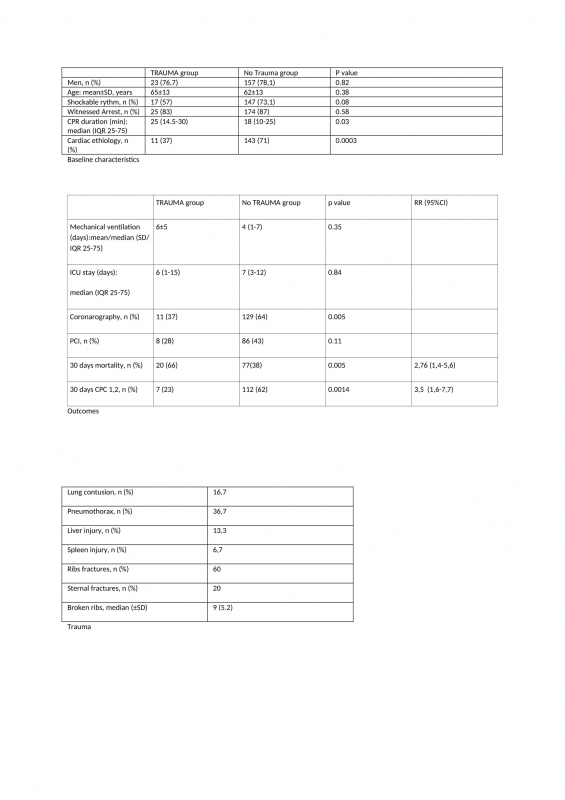PACIENTI S RESUSCITACÍ SDRUŽENÝM TRAUMATEM MAJÍ HORŠÍ 30 DENNÍ PROGNÓZU A NEUROLOGICKÝ STATUS
Introduction
CPR related injuries were not properly observed since were established new guidlines for resuscitation (CPR) 2015
Aim
To determine impact of trauma associated with resuscitation, describe their frequency and seriousness and their influence on morbidity and mortality of patients after OHCA (Out of Hospitals Cardiac Arrest).
Methods
Analyse of data from prospective registry of OHCA from regional Cardiac Arrest Center (CAC), trauma as cause of arrest was no included.
Results
Included 231 patients after OHCA admitted to ICU. 30 (13%) had relevant CPR related trauma established with clinical suspection and confirmed with imagine methods.There was no difference in gender, age, initial shockable rythm and witnessed arrest. There was no differences in duration of bystander CPR, but total duration of CPR untill ROSC was signifficant longer in TRAUMA group (p=0,03). There was no differences in ventilation days and ICU stay. Cardiac cause of arrest was signifficant higher in nonTRAUMA group (p=0,0003) and also coronarography was provided more frequent in nonTRAUMA group (p=0,005), but without difference in frequency of revascularisation. 30 days mortality was signifficant worse in TRAUMA group (66% in TRAUMA group vs. 38% in nonTRAUMA group, p=0,005, RR 2,76, 95%CI 1,4-5,6 ) and 30 days good neurological outcome (CPC 1,2) also worse in TRAUMA group (56% vs. 23% in nonTRAUMA group, p=0,0014, RR 3,5,95%CI 1,6-7,7). In TRAUMA group was lung contusion present by 16,7%, pneumothorax by 36,7%, liver injury by 13,3% and spleen injury by 6,7%of patients. Ribs fractures were by 60% and sternum fractures by 20% of patients. Mean of fracutred ribs was 9± 5,2 ribs.
Conlusion
Trauma is by 13% of OHCA patients without difference in baseline characteristics, but CPR is signifficant longer in TRAUMA group with worse 30-days mortality and neurological outcome.


